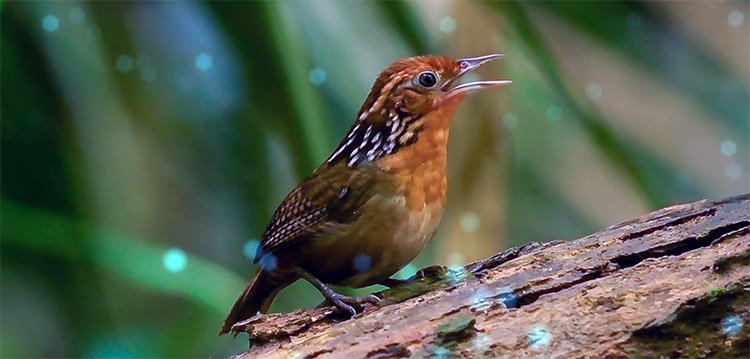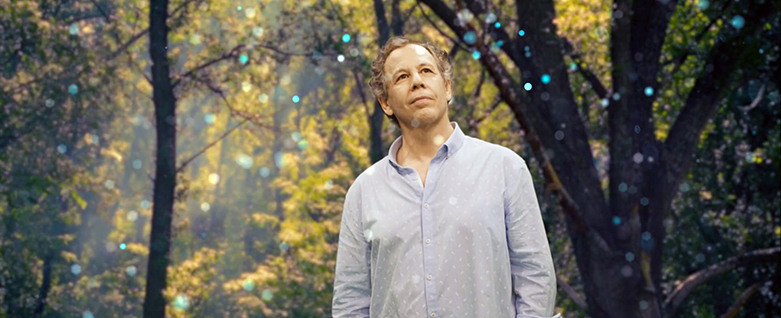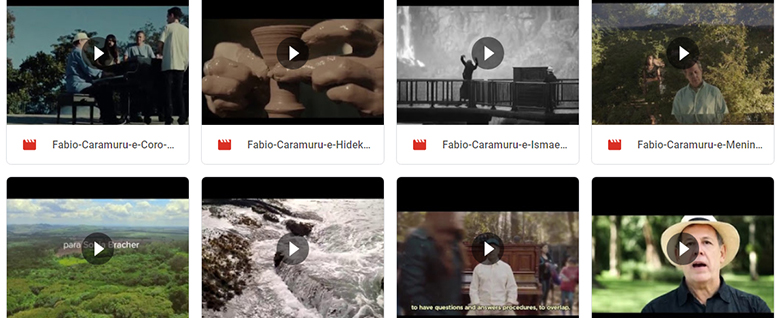Em janeiro de 2022, Fábio Caramuru lançou o novo vídeo EcoMúsica Tangará – Vozes da Natureza, com participação de Vânia Bastos e Aline Alves. O tema musical original foi composto em 2015, integrando o primeiro álbum de Caramuru, EcoMúsica – Conversas de um piano com a fauna brasileira. Agora, em sua versão canção, Tangará recebe um tratamento camerístico, especialmente dedicado à voz suave de Vânia Bastos, promovendo um rico diálogo com o piano. “Trata-se de uma valsa lenta, inspirada na música francesa do século XX, lembrando o clima da enigmática Danseuses des Delphes, de Claude Debussy. Nesse novo vídeo, Vânia Bastos e Aline Alves dançam com movimentos suaves, lembrando bastante a imagem que tenho dessas dançarinas presentes nas colunas gregas da cidade de Delphos.”, comenta Caramuru. Trata-se da segunda obra de Caramuru como compositor de canções, marcando uma nova etapa em seu trabalho de criação. A letra de Alexandre Barros reverencia de forma simples o pássaro-tema, que é representado no vídeo pela atriz Aline Alves, contracenado com a cantora Vânia Bastos. Para além do mérito artístico, o Projeto EcoMúsica agrega ainda uma importante mensagem relacionada à preservação ambiental.
O Projeto EcoMúsica
Fábio Caramuru vem desenvolvendo o projeto “EcoMúsica” desde 2013. Trata-se de uma iniciativa artística pioneira que une música e sons da natureza, com uma importante missão de alerta para a preservação do meio ambiente. Por meio do projeto já foram produzidos os álbuns EcoMúsica Conversas de um piano com a fauna brasileira (2015) e EcoMúsica Aves (2018), os vídeos Cigarra, Tico-tico, Bem-te-vi, Harpia, Araras, Hidorigamo, Amazônia Uirapuru, Quero-quero e Tangará, todos disponíveis no YouTube. O projeto vem contando com o apoio de importantes instituições, tais como o Greenpeace, o Catraca Livre, o Parque Nacional do Iguaçú – Cataratas do Iguaçú, Parque das Aves, prefeituras de diversas cidades brasileiras, embaixadas e consulados brasileiros pelo mundo, além de organismos internacionais do Japão e Canadá.
Amazonia EcoMusica Uirapuru (Musician Wren), a legend of the forest
The pianist and composer Fabio Caramuru released his new video Amazonia EcoMusica Uirapuru, a legend of the forest, on social media:
The video was directed by Otavio Dias, Cecilia Lucchesi was in charge of the scene research and the script was written by Caramuru himself. It was produced entirely during the social distancing period, and this new work portraits the musician on an imaginary trip from his living room to the depths of Brazilian Amazon forest, as he is lured by the mysterious song of the legendary bird Uirapuru, which is rarely seen.
The music, composed and performed by the pianist, is in synchrony with the bird’s call and it revolves amidst an imagistic, dreamlike itinerary of dense and spectacular forests, during which melody and performer progressively adjust to the location, cradled by the hypnotic sounds of the rare and legendary Uirapuru.
In a moment when the preservation of the Amazon forest is the focus of the worldwide attention, the video brings a message of hope for better times, when human beings, flora and fauna would harmonize in perfect synchrony and balance once again.
Uirapuru – the legendary forest bird

Once upon a time, there was an indian warrior named Quaraçá, that lived with his people in the Amazon forest and loved to walk through the woods, playing his bamboo flute. The sound spread out through the trees and hushed the birds, as they all enjoyed listening to the music.
One day, while he was walking around the tribe, Quaraçá felt in love with the beautiful Anahí, an indian who was married to the tribe’s chief.
The young man knew this was an impossible love and sadness soon overtook him. His suffering was such that he would not even want to play the flute anymore.
Sadness was wearing Quaraçá out. He then decided to ask the god Tupã for help. As he walked into the heart of the forest and played the flute, he wept for days and days. Touched by the young man’s misery, Tupã decided to help by transforming him into a small, colorful – red and yellow, with black wings – bird with a beautiful call and named him Uirapuru.
That same day, the bird flew through the forest, went back to the tribe and flew away again. And so he did for many days, delighting the whole tribe with his strong and beautiful melody. Every time Uirapuru saw his beloved one, he would land nearby and sing for her. She was amazed by the sound of that beautiful little bird.
As time went by, even the tribe’s chief became amazed by the song of the Uirapuru. He wanted the bird to sing for him so the chief built a trap, walked into the forest, and eventually disappeared, never to be seen again. Word is that he was punished by Curupira, one of the legendary forest protectors.
Anahí remained alone but had no time for sadness, as Uirapuru would visit her every day, filling her heart with his beautiful song. Uirapuru was sure that with his song Anahi would find out who he was, and that one day he would break the spell. But what we know for sure is that he keeps on singing in the woods until today.
EcoMúsica Project
The EcoMusica project has been developed by the pianist and composer Fabio Caramuru since 2013. It is a pioneering initiative, dedicated to the Brazilian nature, that mixes music and sounds of nature in an inventive way, with the important mission of alerting for the preservation of the environment. Through this project Caramuru already released the albums EcoMusica | Dialogues between a piano and the Brazilian fauna (2015) and EcoMusica | Aves (Birds of Japan) (2018), many music videos such as Cicada, Tico-tico, Bem-te-vi, Harpy Eagle, Macaws, Hidorigamo and Quero-quero (all available on YouTube), as well as several EcoMusica Concerts in Brazil, Japan, and Canada. Fabio Caramuru’s distinctive style is a fresh blend of classic compositional techniques with a contemporary flair. For the EcoMusica repertoire, Fabio’s main thematic materials are borrowed primarily from bird songs and surrounding nature sounds, crafted in elaborated soundscapes for the piano.
Link para baixar os principais vídeos gravados pelo pianista e compositor Fábio Caramuru, apresentando o projeto EcoMúsica, que une piano e sons da natureza:
https://bit.ly/2PDfucL



